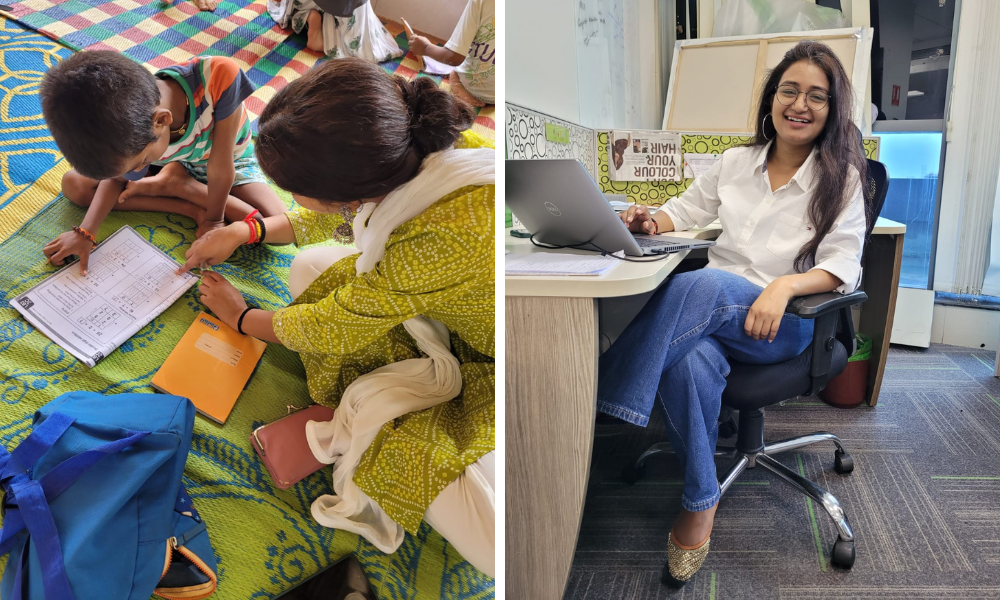
An Interview with Pooja Udayan
The Martin James Foundation warmly welcomes Pooja Udayan as our new Programme Advisor. Pooja, who grew up in a childcare institution in India, brings a wealth of personal experience and a desire to improve the lives of children and young adults with lived experience of care. She is acutely aware of the long road ahead to ensure that alternative care provides the quality education, nurturing, and support essential for young individuals to thrive.
With her unique insights, Pooja is poised to bring a fresh perspective to our work. Guiding us with her expertise, Pooja will play a pivotal role in shaping the programmes and partnerships that MJF proudly supports.
We recently spoke with Pooja to hear more about her experiences and the initiatives she is part of to support young people with lived experience of care.
Question: Could you briefly share your journey from childhood to your current endeavours?
Answer: I lost my mother in an accident at one and my father to illness by seven. My siblings and I struggled to cope until we were taken in by a child care institution (CCI), a stark shift from our previous family life. There, despite the challenges, I adapted and thrived, thanks to the strong focus on education and support.
I earned a degree in Social Work Studies from Galgotias University, which was enriched by internships that focused on empowering young girls and supporting children with disabilities. My career path led me to meaningful roles at Genpact and Croma, advocating for education and women’s empowerment.
As a Chevening Scholar, I recently completed an MSc in Development Studies from SOAS, University of London. My commitment is to support children and young adults from care backgrounds, ensuring they receive quality education and care. I’m actively involved with the India Care Leavers’ Network and youth initiatives in Delhi, providing mentorship and advocating for the rights and needs of care leavers.
Q: What are the primary challenges those growing up and transitioning out of care face?
A: The primary challenge is educational—children entering care late often struggle academically. Even graduates from top schools can find it hard to adjust and connect. They may face neglect from school faculty and receive less help, often due to misconceptions about their abilities and interests.
Transitioning out of care presents hurdles, such as a lack of life skills and mentorship for independent living, which can lead to unemployment and reliance on menial jobs. Unprocessed trauma and societal stigma further complicate their journey into adulthood.
Care leavers often move through multiple CCIs, disrupting their education and emotional bonds. This instability can leave them feeling like commodities rather than individuals with unique needs and potential.
As they re-enter society, the absence of a structured release plan from CCIs covering financial literacy, career counselling, and basic life skills adds to their challenges. Education delays and a lack of job readiness compound these issues, leading to continued financial dependence on NGOs, which are already strained for resources.
Efforts at family tracing and deinstitutionalisation are often hampered by insufficient funding and support, leaving many care leavers in a precarious position as they strive to integrate into society.
Q: What actions should policymakers and decision-makers take to better support children and young adults transitioning from care?
A: Children separated from their biological families are particularly vulnerable and often become overly dependent on care institutions, leaving them ill-prepared for life at 18. The government must recognise them as a vulnerable group within our legal and policy framework.
In India, the Ministry of Social Justice and Empowerment and the Ministry of Women and Child Development need to implement intervention programs that support care levers financially and in their transition to independence. This includes academic and professional support across all states, similar to the 2% reservation for Care Leavers in higher education institutions provided by the Maharashtrian government.
We must accelerate deinstitutionalisation efforts, ensuring that government bodies, NGOs, and other stakeholders collaborate effectively for the timely reintegration of these young adults. This encompasses family tracing, reunification, and financial backing for these processes.
Housing support is also critical. Care leavers should be included in housing schemes, with clear guidelines on rental agreements and budget allocations to provide them with stability and security.
Furthermore, many care leavers struggle with obtaining essential identity documents and permanent addresses necessary to access welfare schemes and developmental programs. Streamlining this process is essential to ensure they can navigate the administrative system and fully benefit from available support.
Q: What specific policy or practice changes are you advocating for to improve the transition out of care?
A: I’m advocating for extended mentoring for care leavers, starting from age 16 up to their mid-20s, to ensure a stable transition into society. This includes maintaining access to support from CCIs and establishing a network for care leavers to share experiences and receive guidance.
Educationally, I’m pushing for scholarships at Indian universities and increased access to vocational training under existing government schemes to enhance care leavers’ job prospects. Additionally, CCIs should collaborate with corporates to prepare care leavers for the workforce.
On the government front, I propose mandated funding for state aftercare programs and one-time financial aid for care leavers to cover initial living costs, facilitating a smoother reintegration into mainstream society.
Q: What advice would you offer to individuals with lived experience of care to leverage their experiences to enhance the care system and facilitate a smoother transition for those ageing out of care?
A: I’d urge them to voice their insights for improving the care system. For example, if they faced hurdles in accessing higher education, they could pave the way for current residents in CCIs by initiating dialogues with universities to establish scholarships tailored for care-experienced youth. Their unique challenges and experiences are invaluable; they hold the power to transform the care landscape and better the lives of those who walk a similar path.




